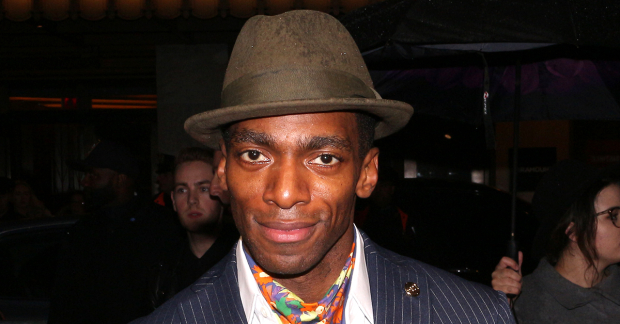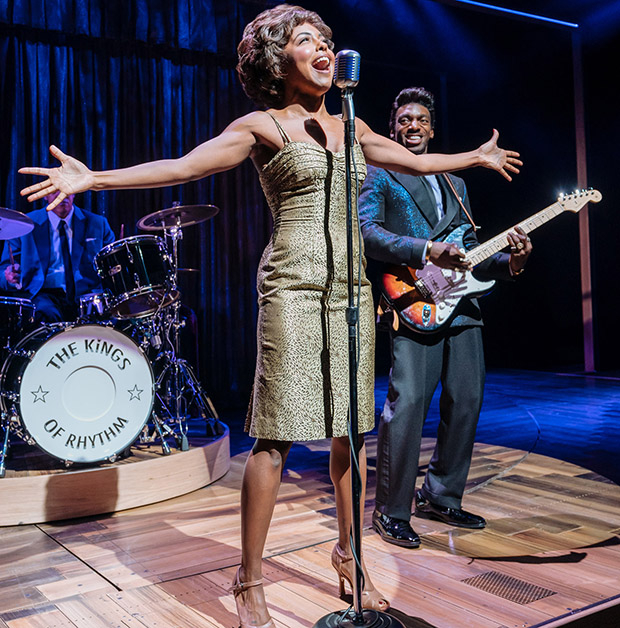Interview: Daniel J. Watts on the Trauma of Playing Ike Turner in Tina
Watts earned a 2020 Tony nomination for his performance.
Eight times a week, Daniel J. Watts was playing one of the scariest roles on Broadway: Ike Turner.
Tina: The Tina Turner Musical doesn't sugarcoat the well-documented instances of mental and physical abuse that Ike inflicted on Tina during their marriage and performing career. And even though Watts was starring alongside a friend for more than a decade, Adrienne Warren as Tina, he acknowledges that the role itself, and Turner's reprehensible real-life actions, were so heavy to bear that he started to need a break.
Of course, he didn't mean for the break to be this long. Nearly a year into the shutdown of Broadway, and now with a 2020 Tony nomination under his belt, Watts is reflecting on what it took to play Ike night after night, while working on a slate of new projects. Chief among them is The Jam: Only Child, a solo piece he's been developing for a long time, which has been filmed for a release this March by Signature Theatre in Washington, DC. Watts was very forthcoming about both projects – and what it's like to get an award nomination when there's no live theater to speak of.

(© David Gordon)
This conversation has been condensed and edited for clarity.
Tina is one of the shows that I feel really bad for a) because I enjoyed it a lot, and b) because you guys had pretty much just opened and were finally hitting a groove when everything shut down. What was it like for you do a role that heavy night after night for several months, and then to just abruptly stop?
The weird thing for me…I wouldn't say I went too deep, but I had done a lot of bouncing around. I was shooting The Marvelous Mrs. Maisel right up until we started Tina, and then I was doing Tina and The Jam simultaneously. Around March, I was a little bit pooped. The week following the shutdown, I was supposed to be going on vacation, and then everything shut down before I got to go. But I needed the break. I was excited for the break of it all. I was thankful at first. I needed a minute. But I didn't realize it was going to be this long. It was weird when I finally realized "I guess we're in a break."
Knowing Ike Turner's story — and particularly his history as an abuser — how did you get into the mind set of that every night, and how did you get used to knowing that the audience wasn't going to be on your side?
That's the hard part. He's not an Ursula, a Cruella de Vil, and there's nothing redeeming about him. Nothing. But knowing that it's not his story — it's Tina's story — helped me get into that. Not to say that Tina is nothing without Ike Turner, but in the Tina Turner story, the shadow that she leaves behind is all that came with Ike Turner. So, getting into that part, knowing that this Black woman's success is dependent upon this ugly-beautifulness with Ike Turner, knowing that people needed to see that trajectory for her, helped me get into an understanding. It wasn't always easy.
I understood his childhood trauma. It's not like I gave him a pass, but I understood the actions. The actions are very manipulative, but at the time, you don't know that it's manipulation. You don't want to lose somebody, so you do all the things you can to keep them there because you're terrified what will happen if you lose this person. You haven't invested into yourself, so they have to stay. Those things I understood. I've been there. I'm not abusive, but I understood that psychology. That made it easier to do. But at a certain point, I wasn't sure whose trauma was whose. Is this me or is this Ike? And that's why I was still in therapy every Friday, all through it. That definitely helped.

(© Manuel Harlan)
I want to switch topics to The Jam: Only Child, which is also rooted in a deeply personal childhood story. Tell me about it.
My great-grandmother used to make jam from scratch. She'd want some jam, but you can't make it one jar at a time; you have to make it in bulk. She used to make herself a jar and give the rest away. When I started writing, I was in Aladdin out of town, but my part got cut and there was not much for me to do, and I needed to do something.
There's a line in Jelly's Last Jam, "We're jamming with Jelly tonight." I never really thought about the play on words. It's about Jelly Roll Morton, and I was thinking about a jam session, but there was jam versus jelly. Jelly doesn't have the seeds and the fruit and the flesh in it, but jam does. Jam still has the guts. I thought, if anything, I want to be the jam. So, the impetus was that my great-grandmother would take something she made and share it with other people, and I wanted to share what I made with other people, and I'll call it The Jam.
Only Child is the first time The Jam has ever had a full narrative. It's mostly been vignettes; pieces strung together. It's a coming-of-age story. I started going to therapy about three-and-a-half years ago, and therapy felt like inviting a stranger to the attic of your mind that you haven't been into in a long time. I noticed that I was hiding. There was stuff in boxes that I didn't want to open. If I was serious about this therapy thing, I had to start going through the boxes. That helped me formulate this version, which is about being an only child in a single-parent home, and a latchkey kid in the South, and how that created a human being that had to learn how to let certain things go.
What was the filming process like?
It was very wham-bam. We shot it in two days. Very quick. The hardest part was getting used to no audience, and by the time I got used to no audience, we were done. I'm proud of it. Liliana Blain-Cruz directed it and she's a genius; James Gardiner is editing and he's done a beautiful job. I'm excited to share it.
Back to Tina — how did she review your performance?
Ms. Turner came onstage at the opening, and she gave me that pretend smacking around, and then she said to me, "So how does it feel to play the villain?" It was a loaded question, right? And I was like, "If you're happy, I'm happy." She said, "You did a great job." That's it, you know?
What does the Tony nomination in this particular instance mean to you?
I can't possibly explain how loved I felt. What I mean by that is, because we're shut down, it wasn't like we got the nominations at eight o'clock in the morning, and now we're running to press junkets, and then into the theater. I was actually able to receive the well-wishes and the gratitude and the cheering from people in a way that I probably wouldn't have been able to if we were still in it. To both be recognized, and then to find out you have people rooting for you that you never knew were rooting for you? I was able to feel that, and that almost eclipsed the nomination itself.







